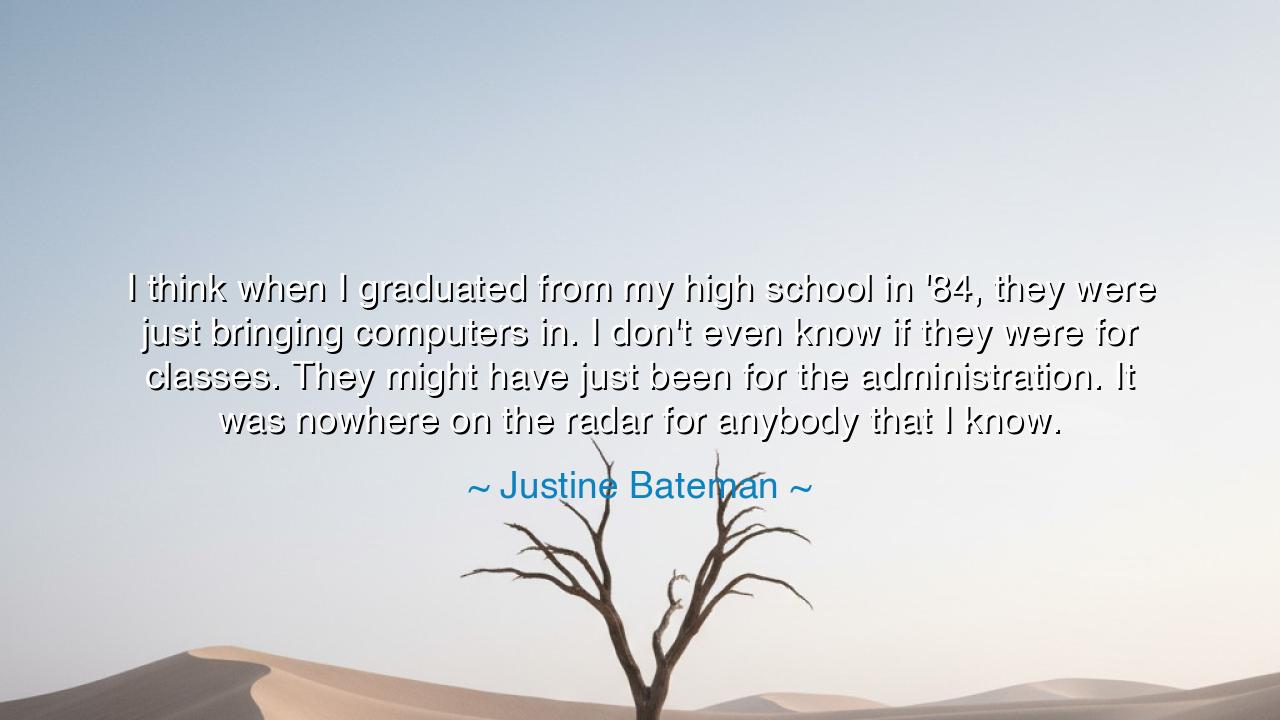
I think when I graduated from my high school in '84, they were
I think when I graduated from my high school in '84, they were just bringing computers in. I don't even know if they were for classes. They might have just been for the administration. It was nowhere on the radar for anybody that I know.






The words of Justine Bateman—“I think when I graduated from my high school in '84, they were just bringing computers in. I don't even know if they were for classes. They might have just been for the administration. It was nowhere on the radar for anybody that I know.”—speak to the dawning of a new era, when the tools of knowledge were emerging yet not yet woven into the fabric of daily life. In this reflection lies a timeless lesson: innovation often arrives quietly, unseen by the many, and its significance is revealed only in retrospect. Bateman’s observation reminds us that the future often begins in the margins, unnoticed by those who inhabit the present.
Her words capture the tension between change and perception. To the students and teachers of 1984, computers were peripheral, perhaps mysterious or bureaucratic, yet not yet recognized as instruments of learning, creativity, or connection. This is reminiscent of the ancients, who observed that new inventions—whether the plow, the compass, or the printing press—often go unheeded at first. The tools themselves may exist, but their power is latent until imagination and vision reveal their potential.
The origin of this quote lies in Bateman’s own recollection of her formative years, when technology was just beginning to infiltrate the halls of education. While the machines may have seemed ancillary, their presence hinted at the profound transformations to come. In retrospect, what seemed peripheral was, in fact, the seed of a revolution that would redefine learning, communication, and human connection. Her words remind us that every innovation, however small at first, carries within it the possibility to reshape the world.
History offers clear parallels. Consider the introduction of the printing press by Johannes Gutenberg in the 15th century. At first, printed books were few, expensive, and of interest to only a small scholarly elite. Most of the populace, unaware of the coming revolution, continued with handwritten manuscripts. Yet the press, quietly introduced, eventually transformed literacy, education, and the dissemination of knowledge across continents. Bateman’s reflection captures the same phenomenon: the emergence of computers in schools marked the beginning of an era whose impact was not immediately visible.
Her insight also emphasizes the human tendency to overlook potential. Just as Bateman’s peers and teachers did not anticipate computers becoming central to learning, societies have often underestimated the transformative power of new tools. The ancients taught that foresight requires imagination, and that the seeds of progress often lie where the eye is untrained to see. To recognize and embrace these seeds is to participate actively in shaping the future, rather than merely observing it passively.
Consider the story of Alan Turing, whose early work on computation in the 1930s was known to few outside a small circle of mathematicians. At the time, the concept of machines performing calculations seemed arcane, even irrelevant to everyday life. Yet Turing’s innovations became the foundation for the digital revolution, illustrating that the quiet beginnings of technology often conceal its ultimate significance. Bateman’s words remind us that we are often unaware when we stand at the threshold of profound change.
The lesson embedded in her words is both practical and philosophical: notice the nascent, the overlooked, and the emerging. Engage with new tools, ideas, and concepts even when they seem peripheral, for their potential may far exceed their immediate appearance. Curiosity, experimentation, and openness are essential to recognizing the significance of innovation before it becomes obvious to all.
And so, my children, remember this eternal guidance: the seeds of transformation often appear quietly, unnoticed by most, yet they carry the power to reshape the world. Pay attention to the emerging tools, the subtle shifts, and the unexplored ideas around you. As Justine Bateman observed in her own life, what is “nowhere on the radar” today may become the cornerstone of tomorrow’s knowledge, creativity, and human advancement.






AAdministratorAdministrator
Welcome, honored guests. Please leave a comment, we will respond soon